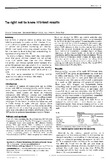The right not to know HIV-test results.

View/
Date
1995Author
Temmerman, M
Ndinya-Achola, J
Ambani, J
Piot, P
Type
ArticleLanguage
enMetadata
Show full item recordAbstract
Large numbers of pregnant women in Africa have been invited to participate in studies on HIV infection. Study protocols adhere to guidelines on voluntary participation after pre-test and post-test counselling and informed consent; nevertheless, women may consent because they have been asked to do so without fully understanding the implications of being tested for HIV. Our studies in Nairobi, Kenya, show that most women tested after giving informed consent did not actively request their results, less than one third informed their partner, and violence against women because of a positive HIV-antibody test was common. It is important to have carefully designed protocols weighing the benefits against the potential harms for women participating in a study. Even after having consented to HIV testing, women should have the right not to be told their result.
PIP:
During January 1989-March 1992 in Kenya, health workers at two prenatal clinics in Nairobi tested 7893 pregnant women for HIV infection. They invited the HIV-positive women to participate in a study of HIV infection among pregnant women. The women gave informed consent to participate in the study, which included counseling before and after the test on HIV and other sexually transmitted diseases (STDs). More than 80% were in a stable marriage. During the first 2 years of the study, more than 90% of the 5274 pregnant women returned to the clinic to learn their test result. 6.1% tested HIV positive. About 25% of the HIV-positive women dropped out of the study before counseling. Only 27.2% told their partner their HIV status. 8.6% returned to the clinic with their partner for HIV testing and counseling. 5.9% of all HIV-positive women suffered violence after HIV counseling. 13 of 19 of these women had communicated their test result to their partner. The high rate of violence forced the staff to change its counseling policy. During the next 2 years of the study, they continued to provide information on HIV and STDs, but they did not set up an appointment for the HIV test results. They informed the 2619 women that they could come any morning for their results or collect them at their next prenatal visit. 11.9% tested positive. Only 35% of the HIV- positive women inquired about their test result. Violence against HIV positive women happened in 1.9% of cases. HIV-positive women and HIV-negative women requested the results of the HIV test at the same rate, suggesting that they did not consider themselves at special risk. These findings show that, even after informed consent, participants in a study of perinatal HIV transmission and intervention should have the right to not be informed about the HIV test results, since the risk of increased violence and loss of security may outweigh the benefits of the study.
URI
http://hinari-gw.who.int/whalecomwww.ncbi.nlm.nih.gov/whalecom0/pubmed/7619122http://erepository.uonbi.ac.ke:8080/xmlui/handle/123456789/40687
Citation
Lancet. 1995 Apr 15;345(8955):969-70.Publisher
Department of Medical Microbiology, University of Nairobi, Kenya.
Collections
- Faculty of Health Sciences (FHS) [10415]
